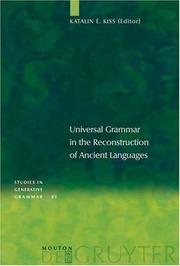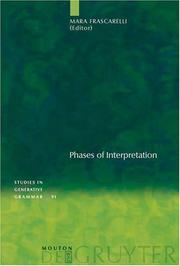| Listing 1 - 4 of 4 |
Sort by
|
Book

ISBN: 9783110346510 Year: 2014 Publisher: Berlin Boston
Abstract | Keywords | Export | Availability | Bookmark
 Loading...
Loading...Choose an application
- Reference Manager
- EndNote
- RefWorks (Direct export to RefWorks)


ISBN: 9783110185508 3110185504 3110902222 9783110902228 Year: 2011 Volume: 83 Publisher: Berlin Boston
Abstract | Keywords | Export | Availability | Bookmark
 Loading...
Loading...Choose an application
- Reference Manager
- EndNote
- RefWorks (Direct export to RefWorks)
Philologists aiming to reconstruct the grammar of ancient languages face the problem that the available data always underdetermine grammar, and in the case of gaps, possible mistakes, and idiosyncracies there are no native speakers to consult. The authors of this volume overcome this difficulty by adopting the methodology that a child uses in the course of language acquisition: they interpret the data they have access to in terms of Universal Grammar (more precisely, in terms of a hypothetical model of UG). Their studies, discussing syntactic and morphosyntactic questions of Older Egyptian, Coptic, Sumerian, Akkadian, Biblical Hebrew, Classical Greek, Latin, and Classical Sanskrit, demonstrate that descriptive problems which have proved unsolvable for the traditional, inductive approach can be reduced to the interaction of regular operations and constraints of UG. The proposed analyses also bear on linguistic theory. They provide crucial new data and new generalizations concerning such basic questions of generative syntax as discourse-motivated movement operations, the correlation of movement and agreement, a shift from lexical case marking to structural case marking, the licensing of structural case in infinitival constructions, the structure of coordinate phrases, possessive constructions with an external possessor, and the role of event structure in syntax. In addition to confirming or refuting certain specific hypotheses, they also provide empirical evidence of the perhaps most basic tenet of generative theory, according to which UG is part of the genetic endowment of the human species - i.e., human languages do not "develop" parallel with the development of human civilization. Some of the languages examined in this volume were spoken as much as 5000 years old, still their grammars do not differ in any relevant respect from the grammars of languages spoken today.
Grammar --- Grammar, Comparative and general --- Extinct languages --- Extinct languages. --- Grammar, Comparative and general. --- Dead languages --- Languages, Extinct --- Comparative grammar --- Grammar, Philosophical --- Grammar, Universal --- Language and languages --- Philosophical grammar --- Grammar, Comparative --- Language obsolescence --- Linguistics --- Philology --- Grammaire comparée et générale --- Langues mortes --- Generative Linguistics. --- Indo-Germanic. --- Language Reconstruction.
Book

ISBN: 1282194666 9786612194665 3110199092 9783110199093 9783110195934 3110195933 9781282194663 6612194669 Year: 2008 Publisher: Berlin Boston
Abstract | Keywords | Export | Availability | Bookmark
 Loading...
Loading...Choose an application
- Reference Manager
- EndNote
- RefWorks (Direct export to RefWorks)
Over the last two decades, focus has become a prominent topic in major fields in linguistic research (syntax, semantics, phonology). Focus Strategies in African Languages contributes to the ongoing discussion of focus by investigating focus-related phenomena in a range of African languages, most of which have been under-represented in the theoretical literature on focus. The articles in the volume look at focus strategies in Niger-Congo and Afro-Asiatic languages from several theoretical and methodological perspectives, ranging from detailed generative analysis to careful typological generalization across languages. Their common aim is to deepen our understanding of whether and how the information-structural category of focus is represented and marked in natural language. Topics investigated are, among others, the relation of focus and prosody, the effects of information structure on word order, ex situ versus in situ strategies of focus marking, the inventory of focus marking devices, focus and related constructions, focus-sensitive particles. The present inquiry into the focus systems of African languages has repercussions on existing theories of focus. It reveals new focus strategies as well as fine-tuned focus distinctions that are not discussed in the theoretical literature, which is almost exclusively based on well-documented intonation languages.
Niger-Congo languages --- Afroasiatic languages --- Focus (Linguistics) --- Discourse analysis --- Grammar, Comparative and general --- Afrasian languages --- Afro-Asiatic languages --- Erythraic languages --- Hamito-Semitic languages --- Semito-Hamitic languages --- African languages --- Grammar. --- Topic and comment --- African languages. --- pragmatics.


ISBN: 3110186845 9783110186840 9786612194092 1282194097 3110197723 9783110197723 9781282194090 661219409X Year: 2008 Publisher: Berlin Boston
Abstract | Keywords | Export | Availability | Bookmark
 Loading...
Loading...Choose an application
- Reference Manager
- EndNote
- RefWorks (Direct export to RefWorks)
This book investigates the concept of phase, aiming at a structural definition of the three domains that are assumed as the syntactic loci for interface interpretation, namely vP, CP and DP. In particular, three basic issues are addressed, that represent major questions of syntactic research within the Minimalist Program in the last decade. A) How is the set of minimally necessary syntactic operations to be characterised (including questions about the exact nature of copy and merge, the status of remnant movement, the role of head movement in the grammar), B) How is the set of minimally necessary functional heads to be characterised that determine the built-up and the interpretation of syntactic objects and C) How do these syntactic operations and objects interact with principles and requirements that are thought to hold at the two interfaces. The concept of phase has also implications for the research on the functional make-up of syntactic objects, implying that functional projections not only apply in a (universally given) hierarchy but split up in various phases pertaining to the head they are related to. This volume provides major contributions to this ongoing discussion, investigating these issues in a variety of languages (Berber, Dutch, English, German, Modern Greek, Hebrew, Italian, Norwegian and West Flemish) and combining the analysis of empirical data with the theoretical insights of the last years.
Grammar, Comparative and general --- Syntax. --- Grammar --- Language and languages --- Syntax --- Linguistics --- Philology --- Grammar, Comparative and general Syntax --- generative syntax. --- minimalist program.
| Listing 1 - 4 of 4 |
Sort by
|

 Search
Search Feedback
Feedback About UniCat
About UniCat  Help
Help News
News